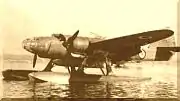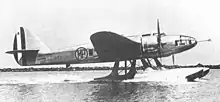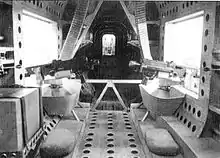Fiat RS.14
The Fiat RS.14 was an Italian long-range maritime strategic reconnaissance floatplane. The RS.14 was a four/five seat all-metal cantilever low/mid-wing monoplane powered by two wing-mounted 626 kW (840 hp) Fiat A.74 R.C.38 engines. It had a conventional cantilever tail unit with a single fin and rudder. Its undercarriage consisted of two large floats on struts. It had a glazed nose for an observer or bomb aimer. The pilot and copilot sat side by side with a wireless operator's compartment behind them. In the bombing role the RS.14 was fitted with a long ventral gondola to carry various combinations of anti-submarine bombs (up to 400 kg (880 lb)).
| RS.14 | |
|---|---|
 | |
| Role | Long-range maritime reconnaissance floatplane |
| Manufacturer | Fiat |
| Designer | Manlio Stiavelli |
| First flight | May 1939 |
| Introduction | May 1941 |
| Retired | 1948[1] |
| Primary users | Regia Aeronautica Italian Co-Belligerent Air Force |
| Produced | May 1941 - September 1943 |
| Number built | 186 plus 2 prototypes[2] |
Development
The RS.14 was designed by Manlio Stiavelli at the CMASA works at Marina di Pisa. The first of two prototypes flew in May 1939.
A prototype landplane version AS.14 was built and first flown on 11 August 1943. It was designed as a ground-attack aircraft and intended to be armed with a 37 mm (1.5 in) cannon and 12.7 mm (0.50 in) machine guns. It was not ordered and no others were built.
Operational history
The RS.14 went into service with the Italian Air Force with a number of maritime strategic reconnaissance squadrons at bases around the Italian coast and also in Sicily and Sardinia. They were used for convoy escort duties and anti-submarine patrols. Occasionally they engaged in aerial combat, obtaining unexpected victories such as when, on Saturday 9 May 1942, an RS.14 intercepted Spitfires that took off from the carriers HMS Eagle and USS Wasp, headed for Malta, and machine-gunned two. The two RAF fighters collided and fell into the sea. Both pilots were killed.[3] After the 1943 Armistice a few survivors were operated by the Italian Co-Belligerent Air Force. At the end of the Second World War the aircraft were used for liaison duties around the Mediterranean carrying up to four passengers.
Variants

- RS.14
- Production float plane with 840 hp (618 kW) Fiat A.74 R.C.38 engines, 188 built including two prototypes.
- AS.14
- Land plane version with retractable landing gear, one built.
Operators
- Italian Air Force operated six surviving Fiat RS.14 until 1948[4]
Specifications

Data from Donald, 1997, pg 413.
General characteristics
- Crew: three
- Length: 14.1 m (46 ft 3.25 in)
- Wingspan: 19.54 m (64 ft 1.25 in)
- Height: 5.63 m (18 ft 5.75 in)
- Wing area: 50 m2 (538.21 sq ft)
- Empty weight: 5,470 kg (12,059 lb)
- Gross weight: 8,470 kg (18,673 lb)
- Powerplant: 2 × Fiat A.74 R.C.38 14-cylinder radial piston , 618 kW (840 hp) each
Performance
- Maximum speed: 390 km/h (242 mph, 210 kn)
- Range: 2,500 km (1,553 mi, 1,350 nmi)
- Service ceiling: 6,300 m (20,670 ft)
Armament
- 1 × 12.7 mm (0.5 in) machine gun
- 2 × 7.7 mm (0.303 in) machine guns
- up to 400 kg (882 lb) of bombs
See also
Aircraft of comparable role, configuration, and era
Related lists
Notes
- Hayles, John, ed. (2008-08-12). "Italian Air Force Aircraft Types". Aeroflight. Archived from the original on 2019-12-27.
- "Fiat RS.14". Archived from the original on 2016-03-04. Retrieved 2014-11-26.
- Rogers 2000, p. 149.
- "Birth of Aeronautica Militare" Aeronautica Militare. Retrieved 13 July 2016
References
- Donald, David, ed. (1997). The Encyclopedia of World Aircraft. Prospero Books. ISBN 1-85605-375-X.
- Monday, David (1984), The Concise Guide to Axis Aircraft of World War II, Chancellor Press, ISBN 1-85152-966-7
- Rogers, Anthony (2000), Battle over Malta - Aircraft Losses & Crash Sites 1940–42, Stroud, Gloucestershire: Sutton Publishing, ISBN 0-7509-2392-X
- The Illustrated Encyclopedia of Aircraft (Part Work 1982-1985), 1985, Orbis Publishing, Page 1812